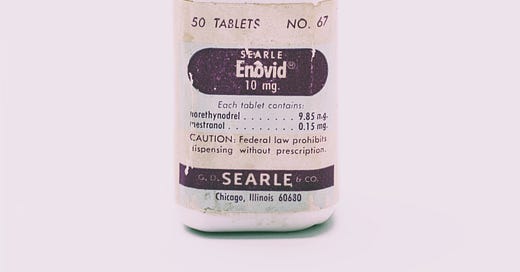May 9, 1960: The FDA approves Enovid-10 or "The Pill"
Today’s Republican lawmakers are attacking women’s autonomy.
A biochemist and a gynecologist in Massachusetts developed Enovid-10 after decades of research going back to the opening of the first birth control clinic in 1916. The effort was funded by Katharine McCormick, who was born into wealth. Before birth control, McCormick focused her resources on uncovering the mysteries of schizophrenia, which inflicted her husband. After his death, McCormick utilized the funds from the inherited estate for philanthropy regarding research that distributes birth control treatment in pill form.
The proliferation of the pill liberated women from being subjugated to the way forced pregnancies, and premature pregnancies, alter one’s life. The development was also part of a larger conversation that revealed how little misogynistic structures considered women’s health and biology. This, of course, is not to shun the intrinsic beauty of fostering new life. But not that long ago existed a world where women faced tremendous ceilings in education and employment and social pressures encouraged them to get married, have a family, and lose themselves in the process. Women lose their ability to contribute to crucial public discussions and changes and that is unhelpful to human development as a species.
On this day, in 1960, the first commercially available birth control pill was approved by the Food and Drug Administration (FDA). The resulting freedoms were a new reality in a generational struggle against systems diminishing women’s agency, autonomy, and independence.
Today we inhabit an America featuring a derelict Republican party that eagerly engages in the revanchist enterprise of limiting birth control and outlawing abortion. In Iowa, Republicans are suspending payments for emergency birth control for survivors of sexual assault. Within his Dobbs opinion, Supreme Court Justice Clarence Thomas alluded to reconsidering the right to privacy concluded under the 1965 Supreme Court case, Griswold v. State of Connecticut. Thus, it is not extreme to think the GOP is also coming for other health measures. Republicans in other states have also tried to ban contraceptives. Missouri Republicans attacked public funding for IUDs and emergency contraception under the rationale that copper IUDs kill a budding life in the wound when it is mainly preventing sperm from egg fertilization.
Though there are some examples of Republicans extending Medicaid and sex ed education, the overwhelming push by GOP machinery to limit access to women’s health care is based on the audience’s false perceptions and fabrications of an amoral libertine society that treats pregnancy (and ending pregnancy) like it’s an Easy Button. It deeply fails to understand, or really imagine, the complexities of women’s bodies: when they know that they are carrying, how to distinguish the signs from other potential problems, and also the multiple risks attached.
The Republican agenda and anti-reproductive rights movement must have a “come to Jesus” moment about why public institutions and funding are needed in these circumstances.
Making it harder for the general public to access all types of healthcare and the GOP’s politicized fostering of treatment deserts animates bad science and makes it hard for society to support a culture of life. Isolated incidents of increased funding in GOP state parties will not suffice and don’t address the party’s deep-seated cultural blind spot. The far-right former party of Lincoln needs to have an agenda-wide reckoning with the excesses of its overdone anti-government philosophy and the cultural deficiencies in their stances on women’s protections, health needs, and general independence.






